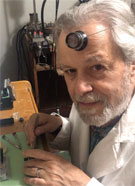Watch 101, 102, 103: Beginning Watch Repair
Note schedule change for fall 2024 Beginning watch repair will be
moving to Monday
Instructor: Dave Davenport & Rob Apsel
Beginning Watch Repair is the starting point for the aspiring
watchmaker, providing a comfortable learning environment of both
lecture and guided application. Students will start on a timing
device, to understand the basic gear train and proper tool
technique. They will then progress to the Elgin size 12 pocket
watch movement, and later the vintage wrist watch. Class sessions
are structured to include a lecture and/or live demonstration followed
by lab time, allowing students to immediately apply the demonstrated
skills in a supported environment, guided by instructors and fellow
students.
- A brief history of time keeping and watchmaking
- Tools and equipment, with a focus on proper use and technique
- The gear train and escapement
- Terminology and nomenclature
- Inspecting and determining the condition of cases and movements
- The pocket watch - history, models, and sizes, disassembly and reassembly
- Purchasing tools, parts, and materials
- How to safely purchase watches on eBay and from online sellers
- The wrist watch, disassembly and reassembly
- Timing and testing a watch
Purchase of some tools by the student is required, and a detailed list of recommended tools and suppliers will be provided for students to purchase before the first class. Tools are discussed in great detail, and students are encouraged to hold off on purchasing tools beyond the initial list until they are discussed in class and recommendations are provided.
Students will also be required to purchase a vintage wrist watch, to be used as their project watch during the final (Spring) quarter. As with tools, students are encouraged to hold off on purchasing their project watch until recommendations are provided in class.
Students who complete this course will be fully prepared to enter Watch 201, expanding their knowledge and skills in the art of watch repair.
Note Beginning Watch is a 3-part series which begins in September and continues for three quarters: Fall, Winter and Spring. It is recommended that students start the series in Fall, as each course builds on the knowledge obtained in prior quarters.
Tuition:
$350.00 per quarter

